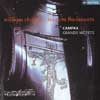Campra Grands Motets
Dramatic, highly coloured music from a golden age of opulence
View record and artist detailsRecord and Artist Details
Composer or Director: André Campra
Genre:
Vocal
Label: Virgin Classics
Magazine Review Date: 4/2004
Media Format: CD or Download
Media Runtime: 67
Mastering:
Stereo
DDD
Catalogue Number: 545618-2

Tracks:
| Composition | Artist Credit |
|---|---|
| Notus in Judea Deus |
André Campra, Composer
(Les) Arts Florissants Chorus (Les) Arts Florissants Orchestra André Campra, Composer William Christie, Conductor |
| Messe de Requiem |
André Campra, Composer
(Les) Arts Florissants Chorus (Les) Arts Florissants Orchestra André Campra, Composer William Christie, Conductor |
| De Profundis |
André Campra, Composer
(Les) Arts Florissants Chorus (Les) Arts Florissants Orchestra André Campra, Composer William Christie, Conductor |
| Exudiat te Dominus |
André Campra, Composer
(Les) Arts Florissants Chorus (Les) Arts Florissants Orchestra André Campra, Composer William Christie, Conductor |
Author: Julie Anne Sadie
After an initial career as a church musician in Toulouse and later in Paris at Notre-Dame, André Campra abandoned it for the theatre. A third career in his later years as a court musician, specifically as one of three sous-maîtres of the King’s Chapel, brought him full circle. The music he composed for royal worship is among his most interesting because he was unable to suppress the verve, one might say greasepaint, of the theatre. In Notus in Judea Deus, a psalm-setting dating from 1725, there are echoes of a battle scene, a sommeil, and a tempest. Exaudiat te Dominus opens triumphantly with trumpets and drums, foreshadowing the bruit de guerre and rescue of the ‘king’ that bring it to a close. Not only these works but the De profundis too are infused with dance rhythms, rhetorical gestures, monologues and dialogues characteristic of the stage. What the French courtiers made of these works is not known but they surely reflect the mood of religious worship at Versailles during the early reign of Louis XV.
Relatively little of Campra’s output of motets (60 petits and 51 grands) is available on recordings. Few musicians if any could perform them today with more precision and authority than William Christie and Les Arts Florissants. The tempi are lithe, giving due rein to Campra’s Italianate ritournelles, and always musical. The solo singing is strongly committed and uniformly articulate. The trios in the De profundis (‘Qui apud Dominum’ and ‘Et ipse redimet’) and Exaudiat te Dominus (‘Domine salvum fac regem’) and the dialogues in the latter (‘Memor sit’, ‘Impleat Dominus’ and ‘Hi in curribus’) are especially beautifully executed, thanks in part to the fine instrumental playing under-pinning them. Like a number of his French contemporaries, Campra was a skillful colourist, who loved nothing more than experimenting with instrumental timbres, the fruits of which are on show here. The sustained choral Introit ‘Requiem aeternam’ that rather grandly concludes the disc is a particular rarity
Relatively little of Campra’s output of motets (60 petits and 51 grands) is available on recordings. Few musicians if any could perform them today with more precision and authority than William Christie and Les Arts Florissants. The tempi are lithe, giving due rein to Campra’s Italianate ritournelles, and always musical. The solo singing is strongly committed and uniformly articulate. The trios in the De profundis (‘Qui apud Dominum’ and ‘Et ipse redimet’) and Exaudiat te Dominus (‘Domine salvum fac regem’) and the dialogues in the latter (‘Memor sit’, ‘Impleat Dominus’ and ‘Hi in curribus’) are especially beautifully executed, thanks in part to the fine instrumental playing under-pinning them. Like a number of his French contemporaries, Campra was a skillful colourist, who loved nothing more than experimenting with instrumental timbres, the fruits of which are on show here. The sustained choral Introit ‘Requiem aeternam’ that rather grandly concludes the disc is a particular rarity
Discover the world's largest classical music catalogue with Presto Music.

Gramophone Digital Club
- Digital Edition
- Digital Archive
- Reviews Database
- Full website access
From £8.75 / month
Subscribe
Gramophone Full Club
- Print Edition
- Digital Edition
- Digital Archive
- Reviews Database
- Full website access
From £11.00 / month
Subscribe
If you are a library, university or other organisation that would be interested in an institutional subscription to Gramophone please click here for further information.




